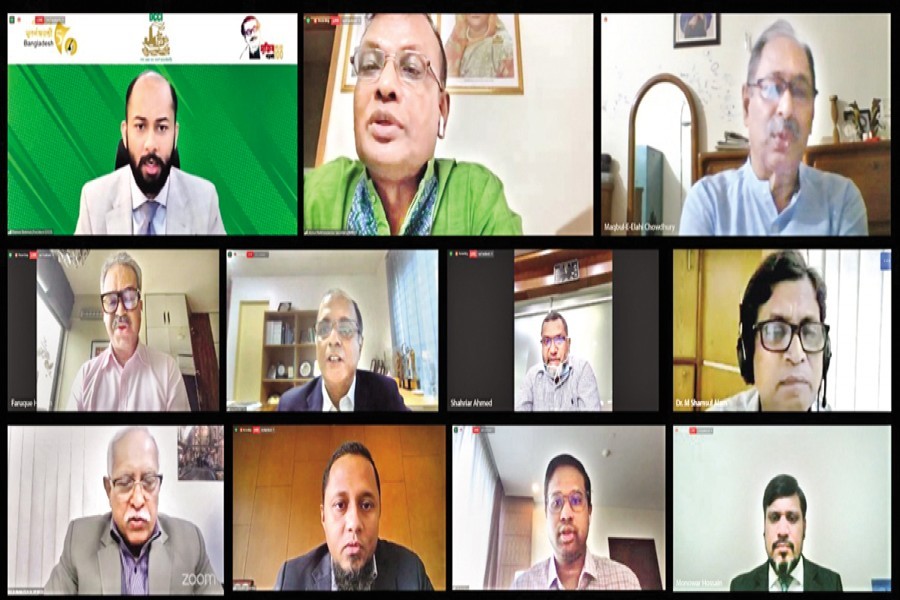Speakers at a webinar on Saturday stressed the need for expediting exploration of new hydrocarbon reserves for sustainability of local industries and ensuring future energy security.
They also sought government action plan to ascertain stable energy pricing for a long time aiming to ensure competitiveness of industries.
Random changes of natural gas and other utilities create bottleneck for entrepreneurs to project the feasibility of their businesses, they noted.
Dhaka Chamber of Commerce and Industry (DCCI) organised the webinar titled "Future of Industrial Fuel Source in Bangladesh: LPG and LNG."
Senior Secretary of Energy & Mineral Resources Division (EMRD) Md. Anisur Rahman was the chief guest at the event chaired and moderated by DCCI president Rizwan Rahman.
Bangladesh Energy Regulatory Commission Member (Gas) Md. Maqbul-E-Elahi Chowdhury was the special guest at the event while former director (operations) of state-run Gas Transmission Company Ltd (GTCL) Kohondkar Saleque Sufi delivered the keynote speech.
Speaking on the occasion, the energy secretary assured the business entrepreneurs of framing necessary business-friendly policy and regulations for doing better business.
He said LNG (liquefied natural gas) use in industries is increasing and business enterprises in Chattogram region are getting the maximum benefit out of it. LPG (liquefied petroleum gas) use in industries is on a limited scale, Mr Rahman added.
Regarding exploration, he said, "Our capacity for onshore exploration is quite satisfactory but for offshore exploration, we still encourage foreign explorers."
The government is continuing exploration and around 100 million cubic feet per day (mmcfd) of gas were added to national gas grid over the past one year, he said.
Alluring international oil companies (IOCs) in offshore exploration, however, remains a major challenge in the current context as many such firms are focusing on LNG business to ensure quick returns of their investments, he said.
The government will establish an LPG terminal in Matarbari where 40,000-tonne capacity vessel will be able to anchor, which will reduce transportation cost of this cooking fuel to one-third of current level, he added.
The EMRD secretary also sought cooperation from businesspeople to check 'gas theft' by unscrupulous people.
Mr Rahman put emphasis on easing the process of getting licence at relatively cheaper rates.
Echoing the necessity of hydrocarbon exploration, the BERC member urged businesspeople to get ready to bear higher energy costs if local exploration is not expedited and growing import dependency continues.
Currently, around 74 per cent of the total natural gas output of around 3,300 mmcfd comes from locally produced gas and remaining 26 per cent comes from LNG imports, said Mr Chowdhury.
Local production might decrease to around 17 per cent and LNG imports grow to around 83 per cent by 2030, he warned.
Citing the outcome of a recent study carried out by a committee constituted by Prime Minister's Office, the BERC member opined for resumption of piped natural gas connections to households as imported LNG is cheaper than imported LPG.
Mr Chowdhury also stressed the need for supplying metered gas to households to check gas pilferage.
Around 1.0-1.2 million new metered household gas connections can be provided with the same gas now being provided to this sector of consumers as it will help check gas pilferage, he said, adding that import of LPG through bulk cargoes will reduce the import cost of LPG.
If the price of LPG comes down and affordable to lower middle income level, the demand for LPG in local market will soar more than double to 3.0 million tonnes per year from existing 1.2 million tonnes by the year 2025, he said.
Energy plays a pivotal role in economic development and industrial progress of a country, said DCCI president Rizwan Rahman.
"To accelerate the industrial growth in a planned and more environment-friendly way, we need to put more focus on import and production of alternative fuel like LPG and LNG alongside natural gas exploration."
The government needs to expedite the process of establishing LPG and LNG terminals, network infrastructure alongside long-term roadmap for sustainable development of this sector, Mr Rahman stressed. Considering the rising demand for LPG, LPG bottling, storage facilities need to be installed under the public-private partnership model, he added.
President of Bangladesh Garment Manufacturers and Exporters Association (BGMEA) Faruque Hassan said around 7.0 -8.0 per cent of the country's total gas supply is used in the RMG sector which is very less in terms of the contribution to the economy.
The RMG sector is also going green, he said adding, "We have 144 LEED green factories and 500 more are in the pipeline."
Thirty-nine out of 100 global top rated LEED certified factories are in Bangladesh, he said.
All these green factories have a significant portion of their energy mix from renewable sources mainly Solar PV, said Mr Hassan.
Managing director of BSRM Aameir Alihussain emphasized on the controlling system loss as well as increasing energy efficiency.
He also called for fuel diversification to reduce risk.
Energy adviser of Consumers Association of Bangladesh (CAAB) Prof Dr M Shamsul Alam, DCCI senior vice president N K A Mobin, DCCI's former director Nuher L Khan, director Arman Haque and convener Malik Talha Ismail Bari also spoke on the occasion.


